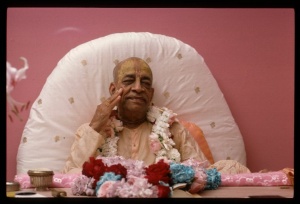CC Madhya 21.60: Difference between revisions
m (1 revision(s)) |
(Vanibot #0054 edit - transform synonyms into clickable links, which search similar occurrences) |
||
| (One intermediate revision by one other user not shown) | |||
| Line 1: | Line 1: | ||
{{ | [[Category:Sri Caitanya-caritamrta - Madhya-lila Chapter 21|C060]] | ||
<div style="float:left">'''[[Sri Caitanya-caritamrta|Śrī Caitanya-caritāmṛta]] - [[CC Madhya|Madhya-līlā]] - [[CC Madhya 21|Chapter 21: The Opulence and Sweetness of Lord Śrī Kṛṣṇa]]'''</div> | |||
<div style="float:right">[[File:Go-previous.png|link=CC Madhya 21.59|Madhya-līlā 21.59]] '''[[CC Madhya 21.59|Madhya-līlā 21.59]] - [[CC Madhya 21.61|Madhya-līlā 21.61]]''' [[File:Go-next.png|link=CC Madhya 21.61|Madhya-līlā 21.61]]</div> | |||
{{CompareVersions|CC|Madhya 21.60|CC 1975|CC 1996}} | |||
{{RandomImage}} | |||
==== TEXT 60 ==== | ==== TEXT 60 ==== | ||
<div | <div class="verse"> | ||
kṛṣṇa kahena—‘kon brahmā, ki nāma tāhāra?’ | :kṛṣṇa kahena—‘kon brahmā, ki nāma tāhāra?’ | ||
dvārī āsi’ brahmāre puche āra bāra | :dvārī āsi’ brahmāre puche āra bāra | ||
</div> | </div> | ||
| Line 12: | Line 16: | ||
==== SYNONYMS ==== | ==== SYNONYMS ==== | ||
<div | <div class="synonyms"> | ||
kṛṣṇa | ''[//vanipedia.org/wiki/Special:VaniSearch?s=kṛṣṇa&tab=syno_o&ds=1 kṛṣṇa] [//vanipedia.org/wiki/Special:VaniSearch?s=kahena&tab=syno_o&ds=1 kahena]'' — Kṛṣṇa said; ''[//vanipedia.org/wiki/Special:VaniSearch?s=kon&tab=syno_o&ds=1 kon] [//vanipedia.org/wiki/Special:VaniSearch?s=brahmā&tab=syno_o&ds=1 brahmā]'' — which Brahmā; ''[//vanipedia.org/wiki/Special:VaniSearch?s=ki&tab=syno_o&ds=1 ki] [//vanipedia.org/wiki/Special:VaniSearch?s=nāma&tab=syno_o&ds=1 nāma] [//vanipedia.org/wiki/Special:VaniSearch?s=tāhāra&tab=syno_o&ds=1 tāhāra]'' — what is his name; ''[//vanipedia.org/wiki/Special:VaniSearch?s=dvārī&tab=syno_o&ds=1 dvārī] [//vanipedia.org/wiki/Special:VaniSearch?s=āsi’&tab=syno_o&ds=1 āsi’]'' — the doorman, coming back; ''[//vanipedia.org/wiki/Special:VaniSearch?s=brahmāre&tab=syno_o&ds=1 brahmāre]'' — to Lord Brahmā; ''[//vanipedia.org/wiki/Special:VaniSearch?s=puche&tab=syno_o&ds=1 puche]'' — inquires; ''[//vanipedia.org/wiki/Special:VaniSearch?s=āra&tab=syno_o&ds=1 āra] [//vanipedia.org/wiki/Special:VaniSearch?s=bāra&tab=syno_o&ds=1 bāra]'' — again. | ||
</div> | </div> | ||
| Line 19: | Line 23: | ||
==== TRANSLATION ==== | ==== TRANSLATION ==== | ||
<div | <div class="translation"> | ||
“When Kṛṣṇa was so informed, He immediately asked the doorman, ‘Which Brahmā? What is his name?’ The doorman therefore returned and questioned Lord Brahmā. | “When Kṛṣṇa was so informed, He immediately asked the doorman, ‘Which Brahmā? What is his name?’ The doorman therefore returned and questioned Lord Brahmā. | ||
</div> | </div> | ||
| Line 26: | Line 30: | ||
==== PURPORT ==== | ==== PURPORT ==== | ||
<div | <div class="purport"> | ||
From this verse we can understand that Brahmā is the name of the post and that the person occupying the post has a particular name also. From the Bhagavad-gītā: imaṁ vivasvate yogam ([[BG 4.1]]). Vivasvān is the name of the present predominating deity of the sun. He is generally called Sūrya, the sun-god, but he also has his own particular name. The governor of the state is generally called rāja-pāla, but he also has his own individual name. Since there are hundreds and thousands of Brahmās with different names, Kṛṣṇa wanted to know which of them had come to see Him. | From this verse we can understand that Brahmā is the name of the post and that the person occupying the post has a particular name also. From the [[Bhagavad-gita As It Is (1972)|''Bhagavad-gītā'']]: ''imaṁ vivasvate yogam'' ([[BG 4.1 (1972)|BG 4.1]]). Vivasvān is the name of the present predominating deity of the sun. He is generally called Sūrya, the sun-god, but he also has his own particular name. The governor of the state is generally called ''rāja-pāla'', but he also has his own individual name. Since there are hundreds and thousands of Brahmās with different names, Kṛṣṇa wanted to know which of them had come to see Him. | ||
</div> | </div> | ||
__NOTOC__ | |||
<div style="float:right; clear:both;">[[File:Go-previous.png|link=CC Madhya 21.59|Madhya-līlā 21.59]] '''[[CC Madhya 21.59|Madhya-līlā 21.59]] - [[CC Madhya 21.61|Madhya-līlā 21.61]]''' [[File:Go-next.png|link=CC Madhya 21.61|Madhya-līlā 21.61]]</div> | |||
__NOTOC__ | |||
__NOEDITSECTION__ | |||
Latest revision as of 22:51, 19 February 2024

A.C. Bhaktivedanta Swami Prabhupada
TEXT 60
- kṛṣṇa kahena—‘kon brahmā, ki nāma tāhāra?’
- dvārī āsi’ brahmāre puche āra bāra
SYNONYMS
kṛṣṇa kahena — Kṛṣṇa said; kon brahmā — which Brahmā; ki nāma tāhāra — what is his name; dvārī āsi’ — the doorman, coming back; brahmāre — to Lord Brahmā; puche — inquires; āra bāra — again.
TRANSLATION
“When Kṛṣṇa was so informed, He immediately asked the doorman, ‘Which Brahmā? What is his name?’ The doorman therefore returned and questioned Lord Brahmā.
PURPORT
From this verse we can understand that Brahmā is the name of the post and that the person occupying the post has a particular name also. From the Bhagavad-gītā: imaṁ vivasvate yogam (BG 4.1). Vivasvān is the name of the present predominating deity of the sun. He is generally called Sūrya, the sun-god, but he also has his own particular name. The governor of the state is generally called rāja-pāla, but he also has his own individual name. Since there are hundreds and thousands of Brahmās with different names, Kṛṣṇa wanted to know which of them had come to see Him.